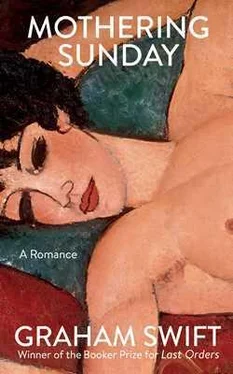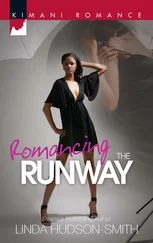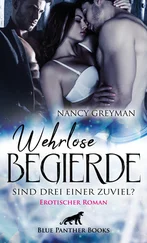Would Ethel even have thought, or would Iris, who had much more to do with the pie: Well if he ate the pie, it was the last meal he ate?
She ascended the stairs. There was another kind of popular book besides the boys’ adventure book and one even favoured by adults. But she would say, in her interviews, that she had never had much time for the detective story. For reading them — let alone writing them. Life itself was riddle enough.
She climbed up from the kitchen into the warmth and light of the upper floors. And now, though she had no actual need to hurry — the clock in the hall said twenty past two and the world was still at lunch — she wished to leave, she had explored sufficiently.
It was then anyway (so she would always know the exact timing of its ringing) that the telephone — or a telephone — rang from some nearby recess she hadn’t previously noticed. She froze. She had the odd sensation that it had rung because she’d moved close to it. She didn’t answer it anyway, it would have been foolish to answer it, though she was quite good at answering telephones. Its ringing went on for some time while she stood stock-still, as if, had she moved, the telephone might somehow have observed her, which was foolish too.
But wasn’t it utterly foolish anyway to be standing here in this unfamiliar hall with nothing on?
She climbed the staircase and re-entered the bedroom. It was the same, of course it was, as she had left it. Only the sun, still flooding in, had lowered its angle a little. There was the open window, the clothes over the armchair, his unwanted trousers, still scarfed with one of her stockings. The pulled-back bedclothes. The patch, a little drier. Yet it seemed like a room round which, even in such a short interval, some invisible fence had been raised. Was it really the room in which. .? Was it really here that. .?
It was the profoundest of questions. Had it really happened?
Beyond the window the birds chirped eternally and in the blue sky she could not see, or would not remember seeing, any flaw.
The mirror on the dressing table offered its last three-fold glimpse of her nakedness. She put on her clothes. They slipped on like some much-used disguise. She touched — only to touch, to stroke, not to tidy — his trousers. She didn’t close the open window. Again, as he might have carelessly left it. Ethel’s job. And who anyway was going to come with a ladder. .? She did not touch the bed, even to cover the patch.
The young men in their frames on the dressing table seemed now oblivious of her. Was it all her vain fancy that they had previously peeped? They looked immovably through her, at some camera that had clicked long ago. She stood in the doorway and took her own last mental photograph. Then left.
In the hall she paused again and took — plucked — one of the orchid flowers from the clusters above the bowl. Well, if he hadn’t, she would. She realised at once that it would be the most incriminating of items, if she were to wear it. If she were to return to Beechwood with an orchid stuck in her frock. But it wasn’t for wearing. She slipped it where earlier in the day she had slipped her half-crown. It would get quickly bruised and tattered perhaps, but it was her proof to herself. It was so she herself would always know. No one else ever would.
Adventure stories, not detective stories. Boys’ books. They were the thing. And her interviewer might say, treating it all as a bit of a joke and not anyway wanting the interview to get too ‘booky’, ‘And boys themselves?’
‘Oh yes,’ she would say with an away-with-you flip of her eighty-year-old hand, as if there had once been queues. The audience in their darkened seats might titter obligingly. And the interviewer might not even see, amid the playfulness, the brief narrowing of the eyes at the change of subject.
It was that life itself might be an adventure. That was the submerged message (the ‘subtext’ they might say now) of all those books. Was there in fact any other way to live? And adventure did not have to be about pirates and narrow escapes. It might be a constant mental hazarding. Suppose, imagine. Imagine. What did writers do with their time? They were the most unadventurous souls on earth, weren’t they? Sitting all day at their desks.
But she would not say such things in interviews. Only, with her protective twinkle and ironically squeezed lips, skirt teasingly round their intimate truth.
I will begin the story of my adventures . .
She put the key under the chunk of stone pineapple. She could not see how Freddy could have broken it with a cricket bat. A battle-axe possibly. And she did not know which one was Freddy in the silver frames. She might have asked, she ought to have asked, but she hadn’t. ‘Which one is which? Tell me about them.’ Would it have been the moment, lying there together? Or would he have fended off the question, a look on his face of having tasted something bad?
Now she would never know.
There, against the wall, was her bicycle, her potentially incriminating bicycle that had incriminated no one. She steered it for a while across the gravel before mounting, drawing deep unsteady breaths. She was slightly sore where she met the saddle. She tucked and gathered her skirt. The air was warm and bright and brimming round her.
A sudden unexpected freedom flooded her. Her life was beginning, it was not ending, it had not ended. She would never be able to explain (or be required to) this illogical, enveloping inversion. As if the day had turned inside out, as if what she was leaving behind was not enclosed, lost, entombed in a house. It had merged somehow — pouring itself outwards — with the air she was breathing. She would never be able to explain it, and she would not feel it any the less even when she discovered, as she would do, how this day had turned really inside out. Could life be so cruel yet so bounteous at the same time?
She rode off. She did not ride — as he’d departed and she’d arrived — along the drive to the gate and the road. Old habit and old secrecy made her take the old route. Past the stables, through the rhododendrons, past the vegetable plot, the potting shed, the cold frames and greenhouse, then along mere threading paths and through narrow gaps between neglected shrubs into a jumbled outer region that led to a copse. Every twist and turn, every screening outbuilding and clump of vegetation was familiar to her. They had met among them and made use of them often enough. It was even his standard directive: ‘the garden path’.
The secret back route from Beechwood to Upleigh would remain always in her head, such that she might at any time have easily drawn its map, like the map in Treasure Island or of David Balfour’s wanderings in the Highlands. She would retain the ability, but of course it would be a contradiction, a betrayal, actually to draw a secret map.
‘The garden path, Jay.’ And, once, with a strange echoing sincerity, ‘I won’t ever lead you up it.’
The copse led to a small wilderness of rough grass and brambles, then a straggly hedgerow, where there was another way out of what was still Upleigh land. It involved lifting the bicycle fully over a stile, but she had done it enough times. She might, of course, have left the bicycle — it was her usual practice — safely hidden in the hedgerow. But his crisp command had simply empowered her. The front door.
Beyond the hedgerow — it was dense and spreading at this point and it seemed that even in the space of hours the hawthorns had sprouted more green leaves and more white frothing blossom — there was the curve of a narrow minor road. Once on its surface, she could speed anywhere, a mere carefree wayfarer, out pedalling on a heavenly Sunday afternoon.
Though for a crippling moment she didn’t know which way to turn. It must have been perhaps three o’clock. She had half the afternoon yet. To turn left would have been the quickest way back to Beechwood, so the obvious choice was right. But where to? Pushing off, she decided that it didn’t matter, the main thing was simply to be riding, careering through this warm exhilarating air, and since the road to the right took her down a long sunny swoop then up a gentle rise (it was the back of the Upleigh grounds) her decision, to be indecisive, was confirmed.
Читать дальше












